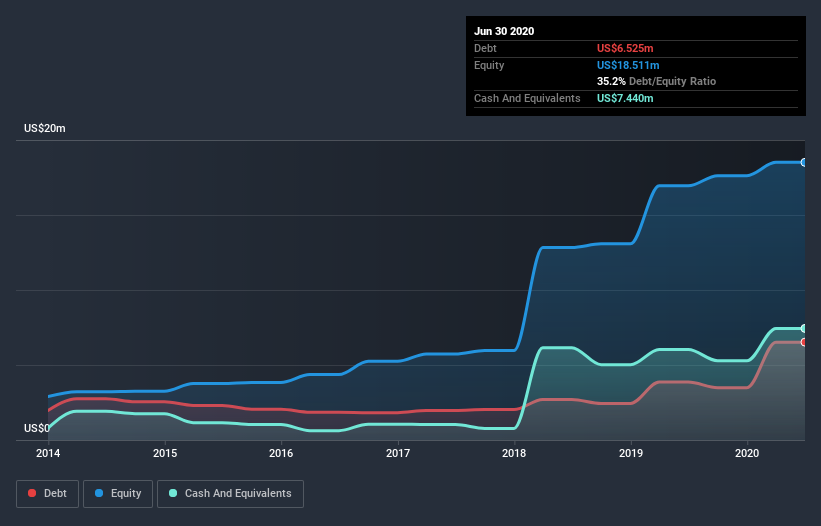Water Intelligence (LON:WATR) Seems To Use Debt Rather Sparingly

Warren Buffett famously said, 'Volatility is far from synonymous with risk.' It's only natural to consider a company's balance sheet when you examine how risky it is, since debt is often involved when a business collapses. As with many other companies Water Intelligence plc (LON:WATR) makes use of debt. But should shareholders be worried about its use of debt?
What Risk Does Debt Bring?
Debt is a tool to help businesses grow, but if a business is incapable of paying off its lenders, then it exists at their mercy. In the worst case scenario, a company can go bankrupt if it cannot pay its creditors. However, a more usual (but still expensive) situation is where a company must dilute shareholders at a cheap share price simply to get debt under control. Of course, the upside of debt is that it often represents cheap capital, especially when it replaces dilution in a company with the ability to reinvest at high rates of return. When we think about a company's use of debt, we first look at cash and debt together.
View our latest analysis for Water Intelligence
What Is Water Intelligence's Debt?
As you can see below, at the end of June 2020, Water Intelligence had US$4.82m of debt, up from US$3.86m a year ago. Click the image for more detail. But on the other hand it also has US$7.44m in cash, leading to a US$2.62m net cash position.
How Healthy Is Water Intelligence's Balance Sheet?
We can see from the most recent balance sheet that Water Intelligence had liabilities of US$6.06m falling due within a year, and liabilities of US$8.13m due beyond that. Offsetting these obligations, it had cash of US$7.44m as well as receivables valued at US$6.10m due within 12 months. So its liabilities outweigh the sum of its cash and (near-term) receivables by US$648.0k.
Having regard to Water Intelligence's size, it seems that its liquid assets are well balanced with its total liabilities. So while it's hard to imagine that the US$90.9m company is struggling for cash, we still think it's worth monitoring its balance sheet. Despite its noteworthy liabilities, Water Intelligence boasts net cash, so it's fair to say it does not have a heavy debt load!
On top of that, Water Intelligence grew its EBIT by 45% over the last twelve months, and that growth will make it easier to handle its debt. The balance sheet is clearly the area to focus on when you are analysing debt. But it is future earnings, more than anything, that will determine Water Intelligence's ability to maintain a healthy balance sheet going forward. So if you want to see what the professionals think, you might find this free report on analyst profit forecasts to be interesting.
But our final consideration is also important, because a company cannot pay debt with paper profits; it needs cold hard cash. While Water Intelligence has net cash on its balance sheet, it's still worth taking a look at its ability to convert earnings before interest and tax (EBIT) to free cash flow, to help us understand how quickly it is building (or eroding) that cash balance. During the last three years, Water Intelligence produced sturdy free cash flow equating to 61% of its EBIT, about what we'd expect. This free cash flow puts the company in a good position to pay down debt, when appropriate.
Summing up
We could understand if investors are concerned about Water Intelligence's liabilities, but we can be reassured by the fact it has has net cash of US$2.62m. And we liked the look of last year's 45% year-on-year EBIT growth. So we don't think Water Intelligence's use of debt is risky. There's no doubt that we learn most about debt from the balance sheet. However, not all investment risk resides within the balance sheet - far from it. Take risks, for example - Water Intelligence has 2 warning signs we think you should be aware of.
When all is said and done, sometimes its easier to focus on companies that don't even need debt. Readers can access a list of growth stocks with zero net debt 100% free, right now.
This article by Simply Wall St is general in nature. It does not constitute a recommendation to buy or sell any stock, and does not take account of your objectives, or your financial situation. We aim to bring you long-term focused analysis driven by fundamental data. Note that our analysis may not factor in the latest price-sensitive company announcements or qualitative material. Simply Wall St has no position in any stocks mentioned.
Have feedback on this article? Concerned about the content? Get in touch with us directly. Alternatively, email editorial-team@simplywallst.com.

 Yahoo News
Yahoo News 

